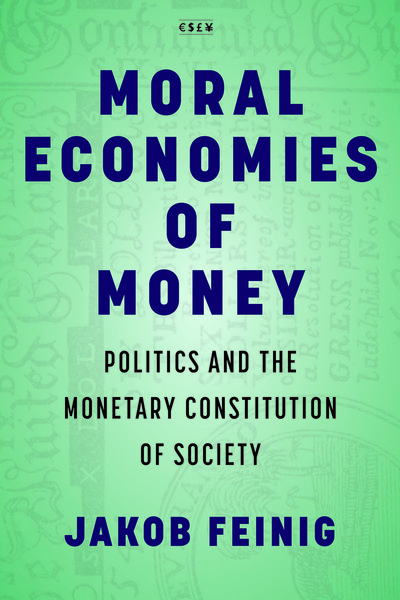
October 2022
208 pages.
from $28.00
Paperback now $14.00 (50% off)
Hardcover ISBN: 9781503629172
Paperback ISBN: 9781503633445
Ebook ISBN: 9781503633452
For much of American history, large numbers of people claimed that money was a public good and asserted the right to shape money creation practices. If popular knowledge about money creation was once widely shared, how and why did it disappear?
In this astute new work, Jakob Feinig shows how the relation between money users and money-issuing governments changed from British colonial North America to today's United States, discussing how popular movements reshaped money-creating institutions, and how their opponents attempted to silence them. He also reveals how monetary and political history unfolds in the tension between "moral economies of money" and "monetary silencing." Offering an introduction to money creation practices since the colonial era, the book enables readers to understand why most people are disconnected from knowledge about money creation today. At the same time, the book also allows readers to situate the recent prominence of Modern Monetary Theory (MMT) against a broader historical background. Historians of capitalism, economic and political sociologists, social theorists, anthropologists of money, and anyone seeking to understand monetary activism, will find this book helps to clarify present-day possibilities in light of historical processes.
About the author
Jakob Feinig is Assistant Professor in the Department of Human Development, College of Community and Public Affairs, Binghamton University.
"In this book, Feinig sets out to make money visible as a practice. He does that with breath-taking effect. Brilliant, thought-provoking, and illuminating."
—Christine Desan, Harvard University
"An absorbingly rich history of the struggles over money in the United States from colonial 'moral economies' to its expropriation by capitalist banking."
—Geoffrey Ingham, University of Cambridge
"In this compelling fusion of sociological insight and historical narrative, Feinig succeeds in clarifying how money politics worked in the past, and why it should be revisited today."
—Roy Kreitner, Tel Aviv University
"Moral Economies of Money: Politics and the Monetary Constitution of Society, the outstanding new book by the sociologist Jakob Feinig, shows that it doesn't have to be this way: we need not settle for a monetary system that breeds apathy or withdrawal into conspiracy theory. To the contrary—for much of this country's history, the conspicuous entanglement of fiscal and monetary policy encouraged money users to participate in the design, implementation, and governance of systems for issuing and retiring currency."
—Aaron Wistar, Jacobin
"The sociologist Jakob Feinig challenges the dominant view of money as a scarce commodity. His masterful book Moral Economies of Money: Politics and the Monetary Constitution of Society demonstrates that money is an elastic public good."
—Sandeep Vaheesan, UCLA Law Review
"To politicize monetary policy is a controversial demand today; to politicize the design of the monetary system can sound positively outlandish. Jakob Feinig's Moral Economies of Money gives us an excellent place to start."
—Pierre-Christian Fink, Phenomenal World
"The clarity and concision of Moral Economies makes the enigmatic into something knowable, teachable, and politicizeable—the value of which will be immediately clear to those who, from classroom experience, know the phenomenon of monetary silence all too well."
—Stephanie L. Mudge, Just Money
"One of the hallmarks of good historical sociology is that it leads us to see the periods we think we know in a new light. [The Moral Economies of Money] does that in so many ways, both big and small."
—Josh Pacewicz, Just Money
"Feinig's book is a critical resource for thinking through such possibilities and expanding our understanding of real resources, theories of value, and the international hierarchy of money."
—Benjamin Wilson, Journal of Economic Issues